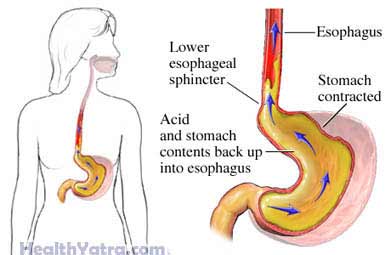Definition
Gastroesophageal reflux disease (GERD) is a disorder that results from food and stomach acid backing up into the esophagus from the stomach. GERD is different from gastroesophageal reflux (GER). GER is a common disorder seen in infants, which causes them to spit up. Most infants outgrow GER within 12 months.
This condition can cause serious health issues. Treatment for GERD includes lifestyle changes, medications, and sometimes surgery.

Causes
Food travels down the esophagus to the stomach. The opening between the esophagus and stomach opens to let food enter the stomach. Normally, it closes as soon as the food enters the stomach. With GERD, the opening does not close tightly. Stomach acid flows into the esophagus, called acid reflux, causing a burning sensation.
The following factors contribute to GERD:
- Abnormal pressure to the lower esophageal sphincter (LES), a valve that keeps food in the stomach
- Increased relaxation of LES
- Increased pressure within the abdomen
Risk Factors
The following may increase the risk of GERD in adolescents:
- Obesity
- Smoking
- Alcohol
Symptoms
If your teen has any of these symptoms, do not assume it is due to GERD. These symptoms may be caused by other conditions.
Symptoms may include:
- Heartburn
- Regurgitation
- Abdominal or chest pain
- Vomiting
- Difficulty swallowing
- Dry cough
- Raspy voice
- Sore throat
- Recurrent pneumonia or worsening asthma
- Weight loss, lack of appetite
Diagnosis
Your doctor will ask about your teen’s symptoms and medical history. A physical exam will be done.
Tests may include:
- Upper GI series —a series of x-rays of the upper digestive system taken after drinking a barium solution
- Upper endoscopy with biopsy—a tube is inserted into esophagus to look at the lining and a piece of tissue is taken for testing
- 24-hour pH monitoring—a probe is placed in the esophagus to keep track of the level of acidity in the lower esophagus
- Short trial of medication
Treatment
Talk with your teen’s doctor about the best treatment plan. Treatment options include the following:
Lifestyle Changes
Before recommending medication, your teen’s doctor may suggest lifestyle changes. These may include:
- Eating smaller, more frequent meals
- Avoiding late night snacks
- Sleeping with the head of the bed elevated
- Lose weight
- Quit smoking
- Avoid alcohol
Foods to avoid may include:
- Chocolate
- Fried foods
- Peppermint
- Spicy foods
- Caffeine products
- Carbonated beverages
- Foods high in fat and acid
Medications
Medication will help relieve symptoms and heal any damage to the esophagus. Many medications for GERD are available over-the-counter and by prescription. Your teen’s doctor may recommend the following:
- Antacids
- H-2 blockers
- Proton pump inhibitors
Procedures
In more severe cases, the doctor may recommend surgery or endoscopy. The most common surgery is called fundoplication. During this procedure, the surgeon wraps part of the stomach around the lower esophageal sphincter. This makes the sphincter stronger and prevents stomach acid from backing up into the esophagus. In many cases, this procedure can be done through small incisions in the skin, calledlaparoscopy.
Prevention
There are no guidelines to prevent GERD.
